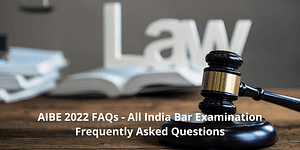LLB Honours
Overview of LLB Hons Course
Law as a profession is reputed across the global world. Every year around 60% of graduates do take up a 3 or 5-year LLB course, LLB Hons. or any integrated law course.
A lot of students today are confused between an LLB course and an LLB Hons. course. Though both degrees are concerned with the legal elements and even have the same syllabus up to an extent, still there is a major difference between the two especially when compared on the basis of the study, LLB Hons. the course offers a deep understanding of law subjects in comparison to an LLB course be it 3 years or 5 years LLB course.
Bachelor of Legislative Law Honours or LLB Honours, just like any other law course, is governed under the authority of the Bar Council of India. This course is divided into 3 years which is further subdivided into 6 semesters which include both theoretical papers and practicals, internships, moot courts, seminars and a whole lot of things. The LLB Hons. course degree does offer amazing opportunities in the legal industry as well as outside legal departments such as HR, Finance and even IT.
To pursue LLB Hons, one has to qualify for any of the top LLB Hons entrance exams such as CLAT, AILET, BHU UET, KLEE, DU LLB Entrance Exam, LSAT etc.
Some of the best premier institutions like NLU Delhi, TNDALU Chennai, NLSIU Bangalore, GNLU Gandhinagar, Symbiosis Pune, Amity University Gwalior, JMI Delhi, WBNUJS Kolkata etc. offer LLB Hons courses. The fees range between ? 20,000- ? 19,00,000 per annum.
Further, the LLB Honours course lands students into reputed job profiles including Attorney, Lawyer, Legal Advisor, Solicitor, Notary, Oath Commissioner, Barrister, Law Reporter Lecturer etc. in various employment areas like Courts, Banks, Corporate Houses, Legal Firms, Financial Institutions, Tax Departments, Law Ministry etc wherein they can easily earn between ? 5,00,000- ?25,00,000 per annum
Table of Contents
- Overview of LLB Hons Course
- LLB Hons Course Highlights
- Why study LLB Hons?
- When to study LLB Hons?
- FAQs about LL.B Hons
- LLB Hons Required Skill Set
- LLB Hons Eligibility Criteria
- Who should study the LLB Hons?
- LLB Hons Admission Process
- LLB Hons Entrance Exams
- LLB Hons Course Syllabus
- LLB Hons Top Colleges
- LLB Hons Jobs
- LLB Hons Salary
- LLB Hons Employment Areas
- LLB Hons Top Recruiters
- LLB Hons Vs LLB: Course Comparison
- LLB Hons Scope in India
LLB Hons Course Highlights
For a quick insight into the LLB Hons course, one must check the details mentioned in the table below.
Parameters | Specifications |
|---|---|
Course Name | Bachelor of Legislative Law Honours |
Short Name | LLB Hons |
LLB Hons Course Level | Undergraduate |
LLB Hons Course Duration | 3 Years |
LLB Hons Course Eligibility Criteria | Graduation |
LLB Hons Course Admission Procedure | Entrance Exam & Merit Based |
LLB Hons Course Top Colleges | NLU Delhi, TNDALU Chennai, NLSIU Bangalore, GNLU Gandhinagar, Symbiosis Pune, Amity University Gwalior, JMI Delhi, WBNUJS Kolkata, etc. |
LLB Hons Average Fees | 20,000-19,00,000 per annum |
LLB Hons Course Jobs | Attorney, Lawyer, Legal Advisor, Solicitor, Notary, Oath Commissioner, Barrister, Lecturer, etc. |
LLB Hons Employment Sectors | Courts, Banks, Corporate Houses, Legal Firms, Financial Institutions, Tax Departments, Law Ministry, etc. |
LLB Hons Course Average Salary | INR 5,00,000- INR 25,00,000 per annum |
Why study LLB Hons?
In India, legal education courses are considered of great value. The LLB Hons professionals are also in demand throughout India as well as abroad. These individuals get lucrative opportunities to work in various departments of government as well as in leading organizations and even educational institutions. A few benefits of the LLB Hons courses are listed below:
- There is a boom of options for LLB Hons graduates. The legal sector is ever-expanding and thus these professionals are always in demand.
- After completion of LLB Hons, one can also take up higher studies such as an LLM, LLD, Ph.D., or MBA to further upgrade their skills and salary packages.
- The course offers high salary packages depending upon skills and years of experience.
- LLB Hons graduates struggle a lot in their starting years but with time and consistent hard work, their lives become secure, especially in terms of finances.
- Another benefit of taking the LLB Hons course is the option of entrepreneurship; individuals after completing these courses can use their certifications and acquired skills to practice independently.
When to study LLB Hons?
Courses like LLB Hons require a lot of hard work and consistency to complete. Aspirants must be aware of certain points before starting an LLB Hons course. These points are:
- Candidates can start with the LLB Hons course right after completing their Graduation Degree.
- Individuals must have a minimum of 3 years of time to complete the LLB Hons course.
- The syllabus of LLB Hons is vast and requires the candidates to give their maximum effort to qualify within the initial time period of 3 years.
- Individuals must also qualify for the related LLB Hons entrance exam, and try to bring a good score to get admission to NLUs and other elite government colleges as they hold much more value than private institutes.
- LLB Hons course is somewhat difficult, thus the individual should be able to devote regular 7-8 hours for self-study for completing the degree
FAQs about LL.B Hons
What is the duration of the LLB Hons course?
The duration for the LLB Hons course is 3 years which is divided into 6 semesters.
What are the top colleges offering the LLB Hons course?
The top colleges offering the LLB Hons course include:
- NLSIU Bengaluru
- NLU Delhi
- NLU Jodhpur
- WBNUJS Kolkata
- GNLU Gandhinagar
- TNDALU Chennai
What are some of the top recruiters of LLB Hons graduates?
The top recruiters of LLB Hons graduates are as follows:
- Anand & Anand
- Bombay Stock Exchange
- S&R Associates
- Kotak Bank
- SBI Bank
- Shardul Amarchand Mangaldas & Co.
- Khaitan & Co.
- Amazon
- Trilegal
- Sagar Associates
- Accenture
What is the eligibility criteria for pursuing the LLB Hons course?
The eligibility criteria for pursuing the LLB Hons course are explained below:
- Applicants must have completed 10 + 2 from a recognized board.
- Applicants must have completed graduation from a recognized university.
- The applicant must score a minimum of 50% aggregate marks in the 10+2 board examination and graduation final year assessment to become eligible for this course.
- Also, the applicant should qualify for the relevant entrance exam with a good score to meet the cutoff of the preferred college.
What is the best age to start with an LLB Hons course?
With respect to the age limit, there are no certain guidelines to pursue LLB Hons, however, it is recommended 18 to 19 years old go for the course, to get better opportunities in the future.
Is distance law valid in India?
No, according to the Bar Council of India, distance law courses are not valid in India.
What are some of the employment areas for the LLB Hons graduates?
The employment areas for the LLB Hons graduates are as follows:
- Courts
- Banks
- Corporate House
- Legal Firms
- Financial Institutions
- Tax Departments
- Law Ministry
- Schools
- Colleges & Universities
- Sales & Excise Departments
- Non-Banking Financial Institutions
How many NLUs are there in India?
There are a total of 23 National Law Universities (NLUs) across different states in India.
Can LLB Hons course be done with a job?
No, LLB Hons course being a full time course cannot be done simultaneously with any government or private job.
Is Maths required for the LLB Hons course?
No, Maths subject is not essential for pursuing a LLB Hons course.
Related Questions
Popular Courses
LLB Hons Required Skill Set
Law courses are of a competitive nature because a lot of students apply for them every year. The entire journey of legal education demands knowledge of theoretical subjects along with certain skills.
Law is a holistic profession; thus, only qualifying for the LLB Hons course exams is not enough. Getting an LLB Hons degree will definitely grant an official certification but one needs to also acquire the skill set to grow their career in the right direction. So, in order to pursue LLB Hons, the students need to have some of the following skills in themselves to be the right fit for that best job they dreamt about.
| Time-Management Skills | Diligence |
Discipline |
|---|---|---|
Empathy | Patience | Resilience |
Self-Confidence | Quick Learner Abilities | Critical-Thinking Ability |
Organizational Skills | Good Communication | Interest in Legal Research & Analysis |
Integrity | Analytical Skills
| Decision-Making Skills |
Self-Motivation Skills | Leadership | Problem-Solving Attitude |
LLB Hons Eligibility Criteria
In India, to pursue LLB Hons, a set guideline with respect to qualification is given by the BCI. LLB Hons courses can be pursued only when the necessary eligibility requirements are fulfilled. Mentioned below are the eligibility norms one must adhere to get into an LLB Hons course in any government or private university.
- Applicants must have completed 10 + 2 from a recognized board.
- Applicants must have completed graduation from a recognized university.
- The applicant must score a minimum of 50% aggregate marks in the 10+2 board examination and graduation final year assessment to become eligible for this course.
- Also, the applicant should qualify for the relevant entrance exam with a good score to meet the cutoff of the preferred college.
- With respect to the age limit, there are no certain guidelines to pursue LLB Hons, however, it is recommended 18 to 19 years old to go for the course, to get better opportunities in future
Who should study the LLB Hons?
- Students interested in legal education & law of the land should surely opt for LLB Hons course.
- Individuals who want fruitful careers by joining top law firms & government organizations or the ones who want to practice independently must also take up LLB Hons course.
- Students who have a high mental presence, and are extroverts are considered best for this course.
- Candidates who have excellent communication and presentation abilities are well suited for the LLB Hons course.
- Analysis abilities are vitally crucial for a good lawyer, thus whosoever is an expert in this, should definitely take up the LLB Hons course.
LLB Hons Admission Process
The admission procedure for the LLB Hons course varies across colleges and universities. Most of the leading Institutions offer LLB Hons courses on the basis of qualifying for the relevant entrance exam, however, in some of the institutions like Amity Law School LLB Hons course admission can be done even on the basis of merit (10+2 & graduation).
How to get admission into the LLB Hons course in India?
To secure admission into the LLB Hons course at a premier institution it is very important to be aware of the entire procedure so that the aspiring student can ensure all fulfillment of all the admission formalities in due time and avoid later hassles. The guidelines stating the LLB Hons admission procedure are highlighted below for your reference.
- First of all, students must check the eligibility criteria of the preferred college and the entrance exam related to it and further register themselves before the last date.
- Secondly, students must take note of important dates such as the date for the application form, the release of admit card, and the date of the entrance exam. This will also help the candidate in planning their preparation smoothly.
- When filling out the application form or later the college application form, candidates must submit all the necessary documents and make sure they are authentic.
- Students must wait for the results and the cut-off lists based on the exam scores.
- The shortlisted students must appear for the counseling session where they will be allotted colleges based on their entrance exam score, availability of course, vacancy of the seat, and document verification. Only after the counseling, the merit list will also be released which will give information about the final admission.
- Lastly, students must pay the admission fee and confirm their seats at the allotted colleges.
LLB Hons Entrance Exams
Most of the premier Institutions offer LLB Honors courses on the basis of entrance exams, so some of them are mentioned below, candidates must go through them and make a note of them.
- AILET- All India Law Entrance Test
- CLAT- Common Law Admission Test
- LSAT- Law School Admission Test
- DU LLB- Delhi University LLB Entrance Exam
- SET SLAT- Symbiosis Entrance Test; Symbiosis Law Admission Test
- MHT CET- Maharashtra Common Entrance Test
- BHU UET- Banaras Hindu University Joint Entrance Test
- KLEE- Kerala LLB Entrance Exam
LLB Hons Course Syllabus
The LLB Hons course is divided into 3 years which are further subdivided into 6 semesters. During the course of the study, a lot of theoretical and practical concepts are taught along with mandatory internships and moot court sessions. The LLB Hons course syllabus is given below to get a deep insight into the curriculum of the LLB Hons course.
First Year:
| History I | English and Legal Language |
|---|---|
| Law of Contract | Economics |
| History II | Political Science I |
| Political Science II | Torts and Consumer Protection Law |
| Legal Reasoning and Communication Skills (Theories and Methods of Moot Court and Communication Skills) | Business Laws and Negotiable Instruments Act |
| Legal Reasoning and Communication Skills (Client Interviewing and Counselling and Moot Court) | Legal Method |
| Law of Crimes I | Administrative Law |
| Family Law I | Family Law II |
Second Year:
| Sociology | Law of CrimesII |
|---|---|
| Constitutional LawI | Constitutional LawII |
| Land Laws | Environmental Law |
| Legal Reasoning and Communication Skills (Moot Court and ADR) | Legal Reasoning and Communication Skills (Legal Aid, Lok Adalat, and Moot Court) |
| Corporate Law I | Corporate Law II |
| Civil Procedure Code I | Civil Procedure Code II |
| Criminal Procedure I | Criminal Procedure II |
| Intellectual Property Law | Law and Emerging Technology |
Third Year:
| Human Rights and International Law | Legal Reasoning and Communication (Moot Court or Public Interest Litigation) |
|---|---|
| Jurisprudence | Rent Law |
| Labour Law I | Law of Arbitration and Conciliation |
| Election Law | Drafting, Conveyancing II, Pleading |
| Taxation Law | International Trade Law |
| Drafting, Conveyancing I, Pleading | Private International Law |
| Development, Law and Poverty | Poverty, Law and Development |
| Labour Law II | Registration, Limitation, Supreme Court Rules, Delhi High Court Rules and Banking and Insurance Laws |
| Court Craft and Legal Ethics | Internship (Lawyers/Law firms) and Research |
LLB Hons Top Colleges
There are around 40+ colleges in India that offer LLB Hons courses. The course is available in both English and Hindi medium and is offered in a regular medium of study.
The regular LLB Hons course from NLUs is considered good in comparison to other LLB Hons colleges, as it makes a huge difference when compared to job opportunities. Also, there is a major difference in their fees, though the subjects taught are the same or similar.
Apart from that the top leading institutions in the countries offer LLB Hons to all graduates. Some of these institutions have also been granted the Grade/ NAAC ‘A’ and are part of the m NIRF Rankings as well, the top 10 are listed below.
Given below are some of the LLB Hons colleges with their average fee structure for informational purposes.
| College Name | Average Fees (INR) |
|---|---|
| NLSIU Bangalore | 1.07 LPA |
| NLU Delhi | 2.60 LPA |
| Symbiosis Law School Pune | 5.35 LPA |
| NALSAR Hyderabad | 1.50 LPA |
| WBNUJS Kolkata | 1.91 LPA |
| IIT Kharagpur | 1.65 LPA |
| Jamia Millia Islamia Delhi | 10K |
| GNLU Gandhinagar | 1.60 LPA |
| Siksha ‘O’ Anusandhan University Bhubaneswar | 2.85 LPA |
| NLU Jodhpur | 1.05 LPA |
| TNDALU Chennai | 1.40 LPA |
| SASTRA Deemed University Thanjavur | 1.00 LPA |
| Amity University Gwalior | 4.70 LPA |
| Bennett University Noida | 3.00 LPA |
| Amity Law School Noida | 19.00 LPA |
| GGSIPU Delhi | 1.05 LPA |
| University of Calcutta | 8.80K |
| PES University Bengaluru | 10.00 LPA |
| University of Delhi | 13.00 LPA |
| University of Lucknow | 20K |
LLB Hons Jobs
When it comes to career opportunities LLB Hons offers some of the highly reputed jobs in legal departments as well as outside legal departments in different corporate organizations and even tech industries. LLB Hons is the most sought-after course and has great value in the world. The LLB Hons course offers some of the reputed job profiles which are listed below. One can also start working independently after completing the LLB Hons course.
- Legal Advisor
- Legal Consultant
- Legal Secretary
- Lecturer
- Notary
- Oath Commissioner
- Law Reporter
- Solicitor General
- Attorney General
- Paralegal
- Public Prosecutor
- Legal Researcher
- Human Rights Commissioner
- Magistrate
- Trustees
LLB Hons Salary
LLB Hons Salary is one thing that attracts students a lot. Some of the high-paying salaries are given to LLB Hons graduates. Along with higher packages, one also gets a respectable position in society and leads a secure life. The average salary for an entry-level LLB Hons graduate is INR 2,00,000- 4,00,000, mid-level LLB Hons graduate earns around INR 4,00,000-12,00,000 per annum and high positions can even earn upto INR 20,00,000 or even more based upon certain factors such as position, skill set and years of experience. These days LLB Hons graduates are offered great opportunities in HR, Finance, IT, and even Edtech, therein they can easily earn around INR 5,00,000-12,00,000 per annum.
Job Position | Average Salary (INR) |
|---|---|
Legal Advisor | 4 LPA |
Legal Consultant | 6 LPA |
Legal Secretary | 10 LPA |
Lecturer | 5 LPA |
Notary | 4 LPA |
Paralegal | 7 LPA |
Trustees | 8 LPA |
Oath Commissioner | 3.5 LPA |
Attorney General | 9 LPA |
Solicitor General | 8 LPA |
Public Prosecutor | 6.5 LPA |
Magistrate | 18 LPA |
Law Reporter | 4.10 LPA |
Human Rights Commissioner | 20 LPA |
LLB Hons Employment Areas
LLB Hons course is not just limited to law departments, courts, or the law ministry but also to other sectors both private and government. Some of the employment areas wherein LLB Hons professionals are called upon to join include:
- Courts
- Banks
- Corporate House
- Legal Firms
- Financial Institutions
- Tax Departments
- Law Ministry
- Schools
- Colleges & Universities
- Sales & Excise Departments
- Non-Banking Financial Institutions
LLB Hons Top Recruiters
LLB Hons graduates are recruited in almost all sectors. LLB Hons career opportunities are available in legal departments, banks, courts & judiciary, telecom, colleges & universities, law firms, multinational companies, business houses, legal consultancies, sales tax, and excise departments, news channels, etc. Some of the top recruiters offering jobs to LLB Hons graduates are as follows:
- Phoenix Legal
- DSK Legal
- Deloitte
- HDFC Bank
- Anand & Anand
- Bombay Stock Exchange
- S&R Associates
- Kotak Bank
- SBI Bank
- Shardul Amarchand Mangaldas & Co.
- Khaitan & Co.
- Amazon
- Trilegal
- Sagar Associates
- Accenture
- AZB & Partners
- Desai & Diwanji
- Vaish Associates
- J Sagar & Associates
LLB Hons Vs LLB: Course Comparison
Many assume that the LLB course & LLB Hons course are the same, however, there is a huge difference between the two especially when it comes to career opportunities and the course detail. The table below differentiates the two courses in detail for better understanding.
When choosing between the two courses one who has decided to pursue law in the future should take up LLB as with this they will get specialization in both humanities subjects and law.m, whereas in LLB Hons course one gets in-depth knowledge of each and every topic and mainly about law and legal world.
Further LLB gives an overview of various subjects but LLB Hons offers the same subjects but with more depth and content. Moreover, in LLB one may not be able to specialize in a specific subject and has to study law in general as a whole. But on the other hand, with an LLB Honors degree, students can specialize in a specific subject. LLB Hons degree may even require a research dissertation in the area of specialization chosen.
Parameters | LLB | LLB Hons |
|---|---|---|
Specialization |
|
|
Admission Process | Both merit and entrance exam based | Both merit and entrance exam based |
Eligibility | 10+2 or equivalent qualification | Graduation degree |
Average Annual Fees | ? 10,000- ? 5,00,000 per annum | ? 1,00,000- ? 2,00,000 per annum |
Job Opportunities |
|
|
Average Annual Salary | ? 3,00,000- ? 8,00,000 | ? 4,00,000- ? 6,00,000 |
LLB Hons Scope in India
Law is a prevalent course field. LLB Hons courses are available in both private Angus government institutes. Legal field jobs are considered prestigious and are universal among students worldwide.
If we deeply analyze the world, we realize that law is practiced in every facet of human existence. India has 23 NLUs out of which most of them offer LLB Hons courses, along with that there are a lot of government and private reputed colleges that offer LLB Hons course. Thus the essence of an LLB Hons degree in a country like India has an ever-expanding demand especially nowadays. LLB Hons course is considered reputed, affordable, and well-paid in India as well as abroad.
The scope of LLB Hons in India as well as abroad. LLB Hons provides reputed positions and high salary packages. Students from any background can pursue LLB Hons courses right after completing their Graduation Degree.
- Courses
- LL.B. Honours


















